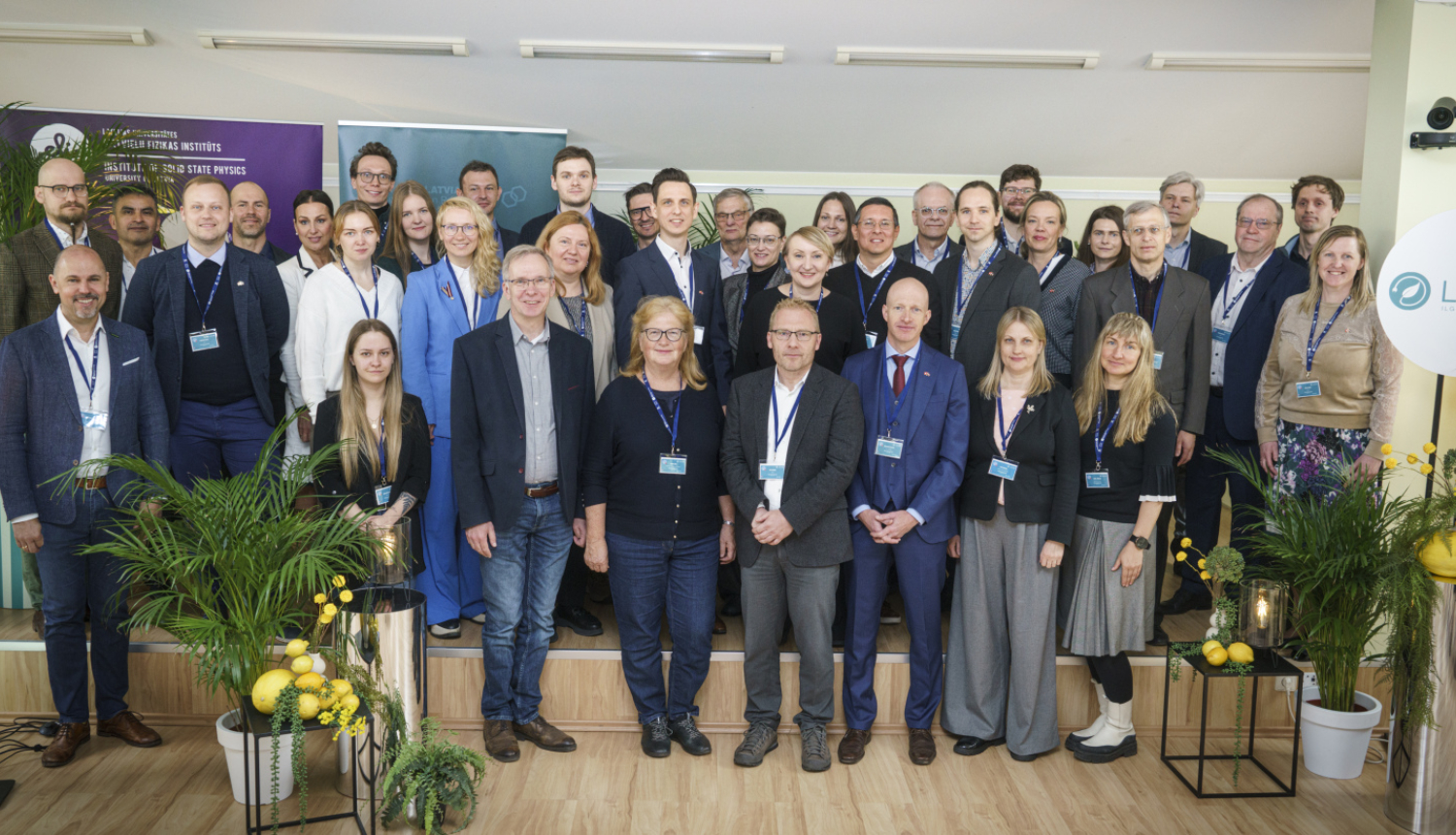On May 6, an ambitious collaboration between Switzerland and Latvia to advance sustainable energy development and engage youth in STEM was officially launched at the Institute of Solid State Physics, University of Latvia (ISSP UL).
The event was honoured by Christoph Liechti, Co-Head of the Swiss Contribution Office at the Embassy of Switzerland in Latvia; Lauma Sīka, Deputy Director of the Department of Higher Education, Science and Innovation at the Ministry of Education and Science of Latvia; Kaspars Ozols, Deputy Director for Development at the Institute of Electronics and Computer Science (EDI); and Andris Anspoks, Director of the ISSP UL. The kick-off event also welcomed representatives from the Latvian Council of Science and industry, alongside consortium partners from both Switzerland and Latvia.
During the opening remarks, the significance of the LACISE project was underscored in light of current global events, particularly in relation to securing Latvia's energy independence and addressing the risks of widespread blackouts, such as those recently experienced in Southern Europe. The project consortium's goals of innovating new battery materials and hydrogen production technologies were commended. Attendees expressed optimism regarding the collaboration between Swiss and Latvian scientists, envisioning that LACISE would pave the way for deeper partnerships in the energy sector and facilitate the development of additional joint project proposals for international funding opportunities.
Dr. phys. Gints Kučinskis, the LACISE project coordinator from ISSP UL, commented on the project's potential impact: “This project will substantially advance research in smart grids, energy storage technologies, batteries, and hydrogen energy materials. It promotes sustainable collaborations with leading Swiss research institutions, offering a valuable platform for high-caliber research activities over the next 4.5 years. Additionally, it provides opportunities for training and mentoring students, equipping them to become future scientists and industry experts in these critical and rapidly evolving fields.”
The event also featured industry representatives from organizations including ABB (Switzerland), Naco Technologies (Latvia), Latvenergo (Latvia), Drive eO (Latvia), Riga Airport, the Latvian Hydrogen Alliance, the Latvian Hydrogen Association, and the Riga TechGirls platform. They participated in establishing a Stakeholder Advisory Board and signing a Memorandum of Understanding that formalizes cooperation within the project. Following these activities, Andris Anspoks invited industry representatives to engage in a panel discussion addressing the challenges that LACISE could help tackle in the energy sector, strategies for attracting new talent to science, and insights into the collaborative process between science and industry.
The launch of LACISE also served as the inception of the Swiss-Latvian Competence Centre, which aims to act as a hub for promoting collaboration, innovation, and knowledge exchange between Switzerland and Latvia. This centre will provide valuable insights into joint projects and research, host workshops and events to enhance bilateral cooperation.
Director of the ISSP UL, Dr. phys. Andris Anspoks: "This project holds great significance for our institute, as it brings together the excellence of both Swiss and Latvian expertise to establish a pioneering centre dedicated to advancing smart energy solutions. Moreover, LACISE will strengthen our collaboration with RTU, EDI, and Swiss partners—leaders in the development of innovative energy technologies—further positioning us at the forefront of this vital field.”
About the Project:
The LACISE project is being implemented as part of the Swiss-Latvian Cooperation Program "Applied Research," overseen by the Ministry of Education and Science of Latvia and the Latvian Council of Science. The total funding for the program amounts to 12,352,941 euros, with Swiss co-financing at 85% or 10,500,000 euros, and Latvian state budget co-financing at 15% or 1,852,941 euros.
Operating from 2025 to 2029, the LACISE project is dedicated to addressing some of today's most pressing energy challenges while simultaneously nurturing the next generation of scientists. It fosters close collaboration among Latvian and Swiss scientists from the ISSP UL, the Institute of Electronics and Computer Science (EDI), Riga Technical University (RTU), Paul Scherrer Institute (PSI), Zurich University of Applied Sciences (ZHAW), and the Swiss Centre for Electronics and Microtechnology (CSEM).
The project is committed to researching and developing solutions that are both immediately applicable and geared toward long-term advancement in essential energy sectors. It aims to enhance the stability of energy supply systems, create next-generation batteries, and improve hydrogen production technologies. LACISE strongly emphasizes engaging youth, particularly young women, in STEM fields to ensure diverse perspectives and ideas that can drive innovation and effectively address today’s complex scientific challenges.





